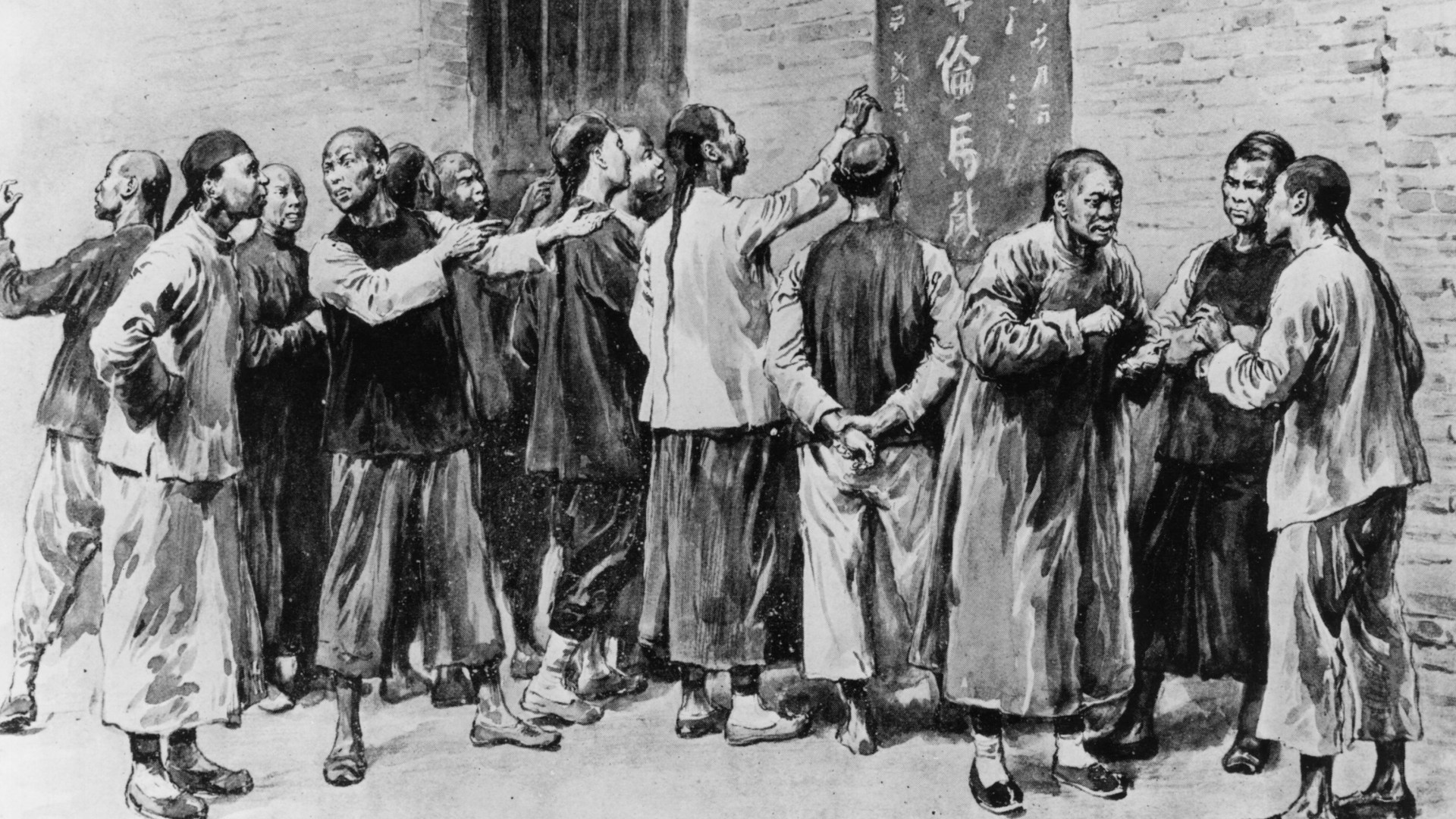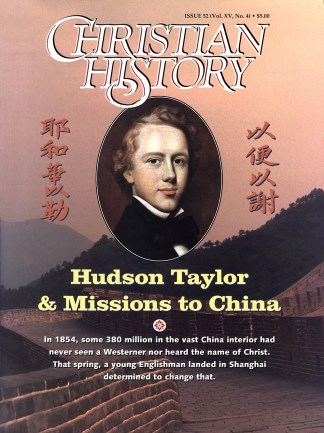On the last day of 1899, Chinese reactionaries abducted Sidney Brooks, a 24-year-old missionary of the Society for the Propagation of the Gospel in Foreign Parts. They tortured him for hours and then murdered him. British authorities acted swiftly; two culprits were executed and an indemnity was demanded. But if the British thought this would quell the rising Chinese resentment, they were wrong.
Within six months, thousands of angry Chinese came screaming out of the villages of North China, twirling swords and chanting, "Burn, burn, burn! Kill, kill, kill!" They tore down chapels, cathedrals, orphanages, hospitals, and schools, and murdered missionaries and Chinese Christians. The uprising is called the Boxer Rebellion, and it dealt the modern Protestant missionary movement its most severe blow ever.
Shanghai mentality
The causes of the uprising were many and complex, but the arrogance of foreigners is as good a summation as any.
Since the 1840s, foreigners had forced China's hand in treaty after treaty, gaining control of large parts of the country. The English, Americans, French, Dutch, Spanish, German, and, the largest group, Japanese, had divided up the country as if they were playing the board game Risk. Foreigners sometimes owned whole cities.
Worse, they swaggered through China knowing they could not be arrested for any crime. If a drunken sailor killed a prostitute or his captain set fire to a trading junk, they were protected by the extraterritoriality that is granted high-ranking diplomats.
Too many missionaries (though hardly Hudson Taylor) adopted a "Shanghai mentality," which regarded the world beyond their enclave as a "heathen colossus." In some places, missionaries were more intimate with British authorities, more interested in playing soccer at the consulate with sailors.
Many foreigners despised the Chinese. One Canadian reported that a "gentle-spirited Norwegian" told him "that after being out here for a few years, he got into such a dulled spiritual condition that he would, on occasions, knock down or beat a Chinese."
Missionary pride and Chinese anger shot up in 1899 when the Chinese government conferred official status on missionaries, making a bishop or superintendent the equal of a provincial governor, and ordinary foreigners the equivalent of district magistrates. Wrote one missionary, "What other government has bestowed such privileges upon ministers of the gospel?"
Many missionaries who did venture forth into the "heathen colossus" did so insensitively. Many publicly ridiculed sacred Chinese beliefs—ancestor worship and Confucian precepts. Some charged into temples while Chinese were worshiping and denounced them for bowing to idols.
One American writer spoke for most foreigners and too many missionaries when he wrote in early 1900, "The day is not distant when China will be delivered from its effete civilization and will come under the power of those motives which have their source in the vital truths of the Christian revelation."
Harmonious fists
By the late 1890s, more and more Chinese decided they had had enough. The Society of Harmonious Fists, or Boxers, led the way.
Their origin is unknown, but by the late 1890s, they had a mystical aura about them. They wore red ribbons around their wrists, yellow sashes, and yellow talismans. They believed they were invulnerable to foreign weapons. Their shamans conducted demonstrations in which a musket (loaded with a blank cartridge) was fired at a follower, "proving" the point. They murmured incantations that induced a trance-like state, and they had secret signals and passwords.
Boxer propagandists stirred up hatred of foreigners. Foreigners were "first-class devils," Chinese converts to Christianity, "second-class devils," and those who worked for or collaborated with foreigners, "third-class devils." They claimed that Chinese children were mutilated in Christian orphanages and that Chinese women were lured into Christian churches to be raped.
They circulated thousands of handbills and proclamations. One, referring to the current drought that was causing great suffering, said, "[Because] the Catholic and Protestant religions are insolent to the gods, extinguishing sanctity, rendering no obedience to Buddha, and enraging Heaven and Earth, the rain clouds no longer visit us. But 8 million Spirit Soldiers will descend from Heaven and sweep the Empire clean of all foreigners!"
Sweeping violence
In January 1900, events accelerated. At Peking (Beijing), reactionary forces were gaining influence with the emperor and, the power behind the throne, the empress dowager, Tz'u Hsi (Ci Xi). Authorities issued an edict that encouraged the Boxers. Throughout late winter and spring, the Boxers increased their attacks. Villages were looted, and the first reports of Chinese Christian killings were heard.
The fury broke loose in June. Buildings of the Presbyterian mission in Shantung (Shandong) were destroyed by a mob. Two English missionaries were killed a few miles northeast of Paotingfu. The plant of the American Board Mission just outside of Peking was burned and many Christians killed.
In mid-June, violence swept into Peking, and international troops were summoned from the coast to protect foreigners. The troops were rebuffed on their way but managed to capture some Chinese forts. The empress dowager regarded the capture as a declaration of war. On June 24, an imperial decree ordered the killing of foreigners throughout China.
In Peking the foreign community hunkered down in a small section of the city for a protracted siege. For missionaries out in the interior, there was nowhere to go. The uprising was not primarily anti-Christian, but missionaries and their converts were the chief sufferers.
At Paotingfu, on June 30 and July 1, 15 missionaries with a number of Chinese Christians were killed.
On July 12, two men, five women, and five children, all foreigners, with five Chinese Christians, were killed at Tat'ung.
At T'aiku six missionaries and eight Chinese were executed on July 31 and their heads taken to the governor.
In the province of Shansi, the governor, Yu Hsien, stage-managed the bloodiest massacre. On the morning of July 9, in Taiyuan, the capital, all Protestant missionaries and their families, Catholic priests and nuns, and several converts were rounded up. They were handcuffed and marched before the governor, who stood surrounded by an armed bodyguard.
A convert who survived the ordeal described what happened. "The first to be led forth was Mr. Farthing. His wife clung to him, but he gently put her aside and going in front of the soldiers knelt down without saying a word, and his head was struck off by one blow of the executioner's axe. He was quickly followed by … Doctors Lovitt and Wilson, each of whom was beheaded by one blow of the executioner. Then Yu Hsien grew impatient and told his bodyguard, all of whom carried heavy swords with long handles, to help kill the others . …
"When the men were finished, the women were taken. Mrs. Farthing had hold of the hands of her children who clung to her, but soldiers parted them and with one blow beheaded their mother. … Mrs. Lovitt was wearing her spectacles and holding the hand of her little boy even when she was killed. She spoke to the people saying, 'We all came to China to bring you the good news of the salvation of Jesus Christ, we have done you no harm, only good, why do you treat us so?' A soldier took off her spectacles before beheading her, which needed two blows."
Thirty-three Protestants and 12 Catholics were killed in like manner, together with a number of Chinese Christians. The heads of some were placed in cages on the city gates.
As news of such massacres spread, missionary families and loyal converts gathered their belongings in bundles, and by foot, mule cart, or donkey tried to escape. Many made for remote rural areas where they lived for days or weeks a nerve-racked, threadbare existence of hunted fugitives. Some were spared or evaded discovery; some were caught and hacked to death.
On August 14, international troops relieved Peking. Peking was looted and punitive expeditions were sent into the surrounding country, which led to more atrocities, this time by the victors. According to one British captain, "Casual exploitation by arrogant detachments of foreign soldiers moving about a prostrate countryside" led to "robbery, assassinations, and nameless outrages … numbers of innocent and peaceful non-combatants were slaughtered … whole districts were ruthlessly and needlessly laid waste."
Some missionaries exploited the situation. Though some prevented looting, others looted freely. One even wrote an article, "The Ethics of Looting." Many mission societies demanded reparations for damages and lives lost. (Hudson Taylor was one missionary who refused indemnities even when offered.)
Rising indignation
Tertullian's comment, "The blood of Christians is seed" proved accurate in China. The courage of the martyrs, both Chinese and missionary, inspired three-fold church growth in the next decade.
Unfortunately, Chinese indignation would continue to build for another fifty years—until the communists successfully expelled all "foreign devils."
Mark Galli is editor of Christian History.
Copyright © 1996 by the author or Christianity Today/Christian History magazine. Click here for reprint information on Christian History.











